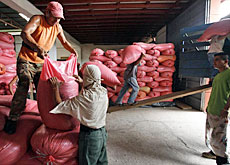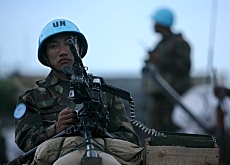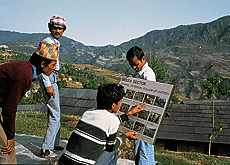Partnerships are new tool to fight poverty

Swiss aid specialists are considering the role of partnerships in ensuring a country's sustainable development as they ponder the future of cooperation.
Their annual development cooperation conference in Bern shone the spotlight on Nicaragua, a country with which Switzerland has developed a strong partnership.
“In general we try to think from the country’s perspective and less as donors…we listen more to what the country needs and proposes,” Jürg Benz, head of the Swiss Agency for Development and Cooperation’s office in Nicaragua, told swissinfo.
Nicaragua is one of the poorest countries in Latin America and has been chosen as a priority recipient for Swiss subsidies. The country relies heavily on foreign assistance, receiving annually around SFr619 million ($500 million) – one tenth of its Gross Domestic Product – in development aid.
Switzerland provides SFr27 million, just three per cent of the total, but has a bigger impact than this amount of money may suggest reckons Benz.
“Our support might seem small, but 25 years of experience in Nicaragua and our ability to work at all levels allows us to play an important role,” he explained.
For Mario Flores, the Nicaraguan finance minister who attended the conference, the fight against poverty is about much more than money. “Effective aid is about genuine partnerships,” said Flores.
National plan
There are presently some 42 bilateral and multilateral agencies operating in Nicaragua, with aid traditionally channelled through projects, many of which are not coordinated.
Over the last few years Nicaragua has taken important steps to improve coordination and efficient delivery of the aid it receives. It has also made major efforts to eradicate poverty, setting out its objectives in a national development plan.
“Switzerland played a constructive role in the difficult process of launching new forms of cooperation,” Flores told swissinfo.
Since 2001 Switzerland has introduced new initiatives, such as its budget support programme. In 2005 it joined forces with other donors active in the country to provide funds to the government to help finance part of its public expenditure, in line with the development plan.
Thanks to this new approach Switzerland and other donors are able to discuss with the government polices aimed at promoting poverty reduction and sustainable, broad-based economic development. The new programme also facilitates coordination and harmonisation of practices with other donors.
“We support the activities and programmes that are part of the development plan. Our cooperation with Nicaragua is a real partnership relationship,” added Benz.
Influence
Foreign Minister Micheline Calmy-Rey spoke at the conference on Friday, warning that Switzerland could lose some of its influence abroad if it did not review its aid policies.
Calmy-Rey said Switzerland was now spending less on aid than other states with comparable financial resources.
She added that development cooperation had helped the country raise its international profile, but that “many nations were substantially increasing their aid budgets”.
The foreign minister said there were various options for Switzerland to ensure it retained its profile in the development aid sector and worked efficiently.
With a “niche” policy, Switzerland would run development programmes based on its own experiences and play to its own strengths, such as democracy, decentralisation and environmental protection.
The Swiss authorities could also consider a policy whereby they collaborate with international programmes everywhere. But this type of action would be hampered by “modest financial means” according to Calmy-Rey.
As to withdrawing funds from some countries to increase spending in others, the foreign minister seems to have ruled out this particular option.
swissinfo, Simon Bradley

More
Swiss Agency for Development and Cooperation (SDC)
The SDC annual development conference took place on Friday August 25, 2006 in Bern.
The theme of this year’s conference was “Joining forces – development through partnerships”.
Presentations were given by Micheline Calmy-Rey, the Swiss foreign minister, Mario Flores, Nicaragua’s finance minister, Jean-Daniel Gerber, the head of the State Secretariat for Economic Affairs, and Walter Fust the SDC director.
Four workshops were held to discuss in depth different aspects of development partnerships, followed by a panel discussion on the subject.
Nicaragua
Population: 5.1 million with 1.7% growth rate (lowest population density in the region)
GDP: $950 per capita (one of lowest in Latin America)
GDP growth: 3 per cent (2000-2005)
Living in poverty: 45%
Living in extreme poverty: 15%
Attending primary school: 82%
Access to clean water: 73%
Central America is a priority region for Swiss development cooperation, with SDC activities focusing on Nicaragua, Honduras and El Salvador. Cooperation between the countries in these priority areas is fostered through regional projects which also involve the remaining countries in the region.
In the humanitarian aid sector, SDC’s commitment focuses mainly on prevention and preparedness, given the repeated threat of natural disasters.
Cooperation with Nicaragua focuses on the following sectors: agriculture, drinking water, and promoting small businesses.
These are flanked by substantial humanitarian aid tasks, as well as by support through budget assistance (with funds and technical back-up from seco) and help in governance issues.
SDC’s annual expenditure totals some 10 million CHF for Nicaragua, and approximately 22 million CHF at the level of the overall Central America programme. Budget assistance accounts for about 9 million CHF per year.
In addition, Switzerland is very involved in the coordination of international development activities (harmonization and alignment).

In compliance with the JTI standards
More: SWI swissinfo.ch certified by the Journalism Trust Initiative




You can find an overview of ongoing debates with our journalists here. Please join us!
If you want to start a conversation about a topic raised in this article or want to report factual errors, email us at english@swissinfo.ch.